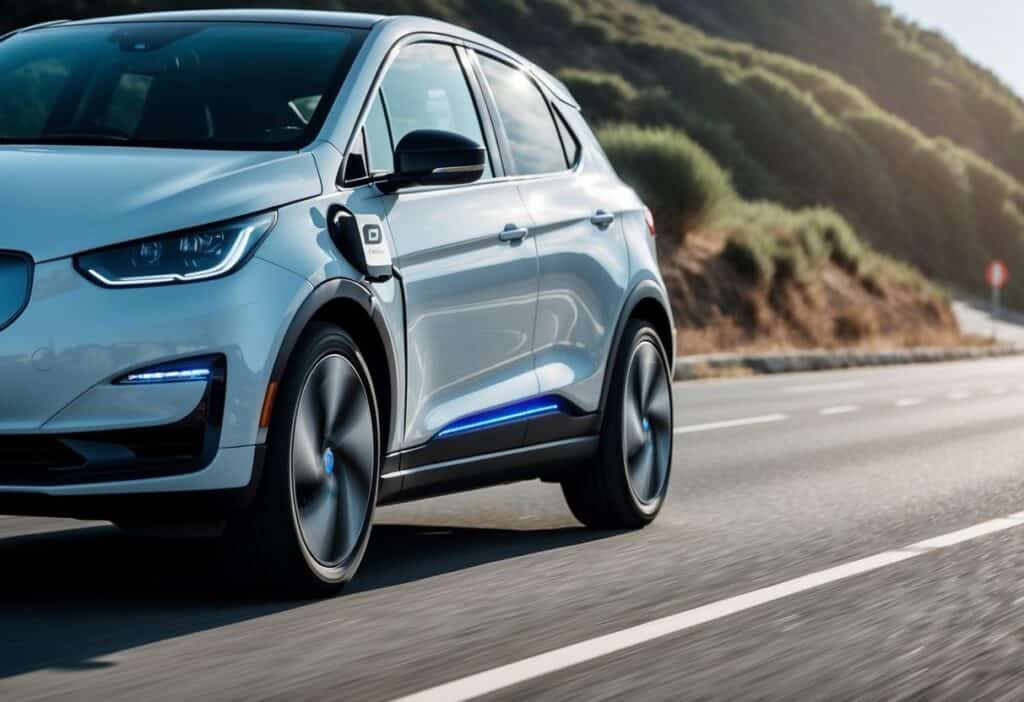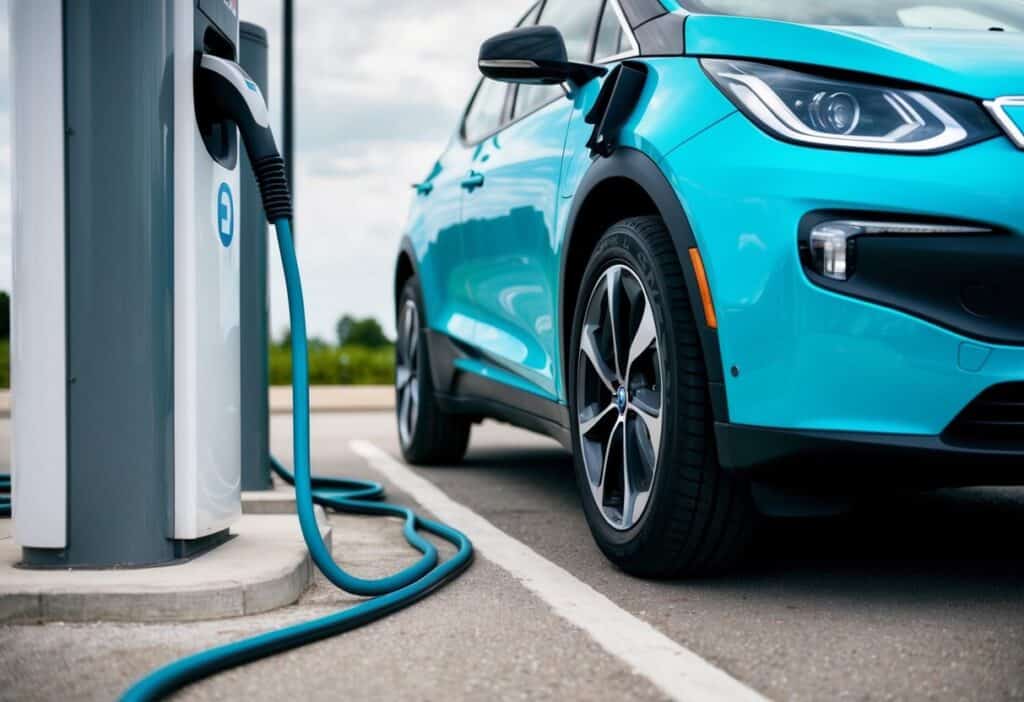Electric cars are different from regular cars in many ways. One key difference is their tires. Many people wonder if electric vehicles need special tires.
Electric cars do need special tires designed for their unique needs. These tires are made to handle the extra weight of electric car batteries and provide low rolling resistance to help extend driving range.
EV tires are also built to cope with the instant torque of electric motors. They have stronger sidewalls and special tread patterns. Using the right tires can make a big difference in an electric car’s performance, efficiency, and safety.
Understanding Electric Vehicles and Their Tire Needs
Electric vehicles (EVs) have unique needs when it comes to tires. Their weight and power delivery affect tire requirements. Let’s explore the basics of EVs and why they need special tires.
Electric Vehicle Basics
EVs run on rechargeable batteries instead of gas engines. They have electric motors that provide instant torque. This means EVs can accelerate quickly from a stop.
EVs are often heavier than gas cars due to their batteries. For example, the GMC Hummer EV Pickup weighs over 9,000 pounds. This extra weight puts more stress on the tires.
EVs are also very quiet. Without engine noise, tire sounds become more noticeable. This creates a need for tires that roll quietly.

The Importance of Special Tires for Electric Vehicles
EV-specific tires are designed to handle the unique challenges of electric cars. They can support more weight and deal with instant torque.
These tires affect an EV’s range significantly. Pirelli says tires influence 20-40% of an EV’s range, compared to 15-20% for gas cars.
EV tires need to:
- Handle heavy vehicle weight
- Withstand quick acceleration
- Provide low rolling resistance for better range
- Run quietly to match the EV’s silent operation
Choosing the right tires can help EVs perform better and go farther on a single charge. This makes special tires a key part of EV technology.
Check out Are Electric Car Tires Different?
The Science of EV Tires
EV tires are designed to handle the unique demands of electric vehicles. They use special compounds, tread patterns, and construction to improve efficiency and performance.
Role of Tread Compound in EV Tires
EV tires use special rubber compounds to meet the needs of electric cars. These compounds are made to grip well and last longer. The rubber is softer than normal car tires. This helps the tires stick to the road better.
Soft rubber also makes less noise. EVs are very quiet, so tire noise is more noticeable. The compounds used in EV tires help keep things hushed.
These special rubber blends also help with efficiency. They’re made to roll more easily, which saves battery power. This can help EVs drive farther on a single charge.
Tread Depth and Tread Design Considerations
Tread depth and design are key for EV tires. The tread needs to be deep enough to grip the road and channel away water. But too much depth can waste energy.
EV tire treads often have unique patterns. These patterns help reduce noise and improve efficiency. They also need to handle the extra weight of EVs.
Some EV tires have asymmetric tread designs. This means the inside and outside of the tire look different. It helps the tire perform well in various conditions.
Low Rolling Resistance and Its Significance
Low rolling resistance is crucial for EV tires. It means the tires don’t waste much energy as they roll. This helps EVs go farther on a single charge.
Tire makers use special designs and materials to cut rolling resistance. The tread compound, tire shape, and internal structure all play a part.
Low rolling resistance tires can boost an EV’s range by up to 10%. This is a big deal for EV owners who want to drive farther between charges.
These tires also help with acceleration. EVs have instant torque, and low rolling resistance tires help put that power to the ground efficiently.
Check out Does an Electric Car Have a Transmission?
Performance Factors for EV Tires
EV tires face unique challenges due to the specific characteristics of electric motors. These tires must handle high torque, heavy loads, and provide optimal traction for maximum efficiency.
Managing Load and Torque in Electric Motors
Electric cars are heavier than gas-powered ones due to their batteries. This extra weight puts more stress on the tires. EV tires need stronger sidewalls and reinforced structures to support this added load.
The instant torque of electric motors also affects tire performance. EV tires must be designed to handle quick acceleration without wearing out fast. This means using tougher rubber compounds that can withstand the forces of rapid starts and stops.
Tire makers use special tread patterns for EVs. These patterns help distribute the load evenly across the tire surface. This even distribution reduces wear and extends tire life.
Instant Torque and Its Impact on Tires
Electric motors deliver full torque instantly when you press the accelerator. This quick power surge can cause rapid tire wear if not managed properly. EV tires use special rubber compounds to resist this wear.
The instant torque also affects tire grip. EV tires need to maintain contact with the road during fast acceleration. Tire makers use softer rubber compounds to improve grip and traction.
These tires also have wider contact patches. A wider patch helps spread out the forces from instant torque. This design choice improves both grip and wear resistance.

Traction Requirements for Electric Vehicles
EVs need good traction for efficient power use. Better traction means less energy wasted on wheel spin. Tire makers use special tread designs to improve grip on various road surfaces.
Low rolling resistance is key for EV range. Tires with low rolling resistance help EVs go farther on a single charge. But these tires must still provide enough grip for safe driving.
Wet traction is crucial for EVs. The instant torque can cause skidding on wet roads. EV tires use special tread patterns and rubber compounds to cut through water and maintain grip.
Check out Can You Jump Start an Electric Car?
Design and Technology in EV-Specific Tires
EV-specific tires use special designs and technologies to meet the unique needs of electric vehicles. These tires focus on reducing noise, improving efficiency, and handling the higher weight and torque of EVs.
Tire Noise and the Pursuit of a Quiet Ride
Electric cars are much quieter than gas-powered vehicles. This makes tire noise more noticeable. Tire makers have come up with ways to reduce this noise.
Some use special tread patterns that lower sound levels. Others add foam inside the tire to absorb vibrations. These methods help create a quieter ride in EVs.
Bridgestone’s Turanza EV tire is a good example. It offers a quiet ride without using heavy foam inserts. This helps keep the overall weight down.
Advanced Tire Technologies for EVs
EV tires need to handle more weight and instant torque. They also need to help extend the car’s range. This calls for new tire tech.
Tire makers use stronger materials to support the extra weight of EV batteries. They also create special rubber compounds that grip well but don’t wear out quickly.
Low rolling resistance is key for EV tires. It can affect 20-40% of an EV’s range. Tire designers work to find the right balance between grip and efficiency.
Innovations by Tire Manufacturers
Major tire companies are creating new products just for EVs. Goodyear’s ElectricDrive GT is one such tire.
It uses a special tread compound to handle high torque. The tread pattern is designed to reduce noise. It also has features to help extend EV range.
Michelin has developed tires that can handle the sharp weight transfers in EVs. Their designs account for the instant power delivery of electric motors.
Pirelli offers tires with special sidewall markings for EVs. These tires are made to work well with the unique features of electric cars.
Check out Electric Car Tires vs Regular Tires
Maintenance and Longevity of EV Tires
EV tires need special care to last longer and perform better. Proper upkeep can save money and keep your car running smoothly.

Optimizing Tire Life and Wear
EV tires tend to wear out faster due to the car’s weight and quick acceleration. To make them last:
- Rotate tires every 5,000-8,000 miles
- Keep wheels aligned
- Avoid hard braking and fast starts
Smooth driving helps a lot. It reduces stress on tires and extends their life. Some EV-specific tires are made to handle the extra weight and torque. These may last longer than regular tires on electric cars.
The Importance of Tire Pressure Monitoring
Correct tire pressure is key for EVs. It affects range, safety, and tire life. Most EVs have built-in tire pressure monitoring systems (TPMS). Use them to:
- Check pressure weekly
- Add air when needed
- Look for slow leaks
Proper inflation saves energy and extends tire life. It also improves handling and safety. Check the owner’s manual for the right pressure. Don’t forget to adjust for temperature changes and load.
Understanding Tire Maintenance for Electric Cars
EV tire care is a bit different from gas cars. Key points:
- Check tread depth often
- Look for uneven wear
- Balance tires as needed
EVs are heavier, so tires may need replacing sooner. Some drivers get special EV tires for better performance. Regular inspections can catch problems early. This helps avoid costly repairs or accidents.
Tire care affects an EV’s range too. Well-maintained tires roll easier, using less power. This means more miles per charge. Good tire care is good for your wallet and the environment.
Check out How to Become an Electric Car Mechanic in UK
Comparison with Gas-Powered Car Tires
Electric vehicles (EVs) and gas-powered cars have different tire needs. EVs require tires that can handle more weight and provide better efficiency. Gas-powered cars use traditional tires designed for internal combustion engines.
Differences Between EV Tires and ICE Vehicle Tires
EV tires are made to support heavier vehicles. They have stronger sidewalls and reinforced construction. This helps them carry the extra weight of battery packs.
EV tires also focus on low rolling resistance. This improves the car’s range by reducing energy loss. The tread patterns are often designed to minimize friction.
In contrast, gas-powered car tires don’t need to be as sturdy. They can have softer compounds that grip the road better. This is because ICE vehicles are typically lighter and don’t rely as much on efficiency for their range.
Road Noise and Performance Disparities
EV tires are engineered to be quieter. This is important because electric cars make less noise overall. The tire noise is more noticeable without the sound of an engine.
Special foam inserts or sound-absorbing materials are often used in EV tires. These features help reduce road noise inside the car.
Gas-powered cars can use tires with louder tread patterns. The engine noise masks some of the tire sounds. Performance tires for ICE vehicles may prioritize grip over noise reduction.
EV tires must balance performance with efficiency. They need to provide good traction for the instant torque of electric motors. At the same time, they must not drain the battery too quickly.
Check out Should I Buy or Lease an Electric Car?
Selecting Replacement Tires for Your Electric Car
Electric cars need tires that can handle their weight and provide good efficiency. Choosing the right tires involves looking at key features and understanding how they’re built.
Criteria for Choosing the Right EV Tires
When picking new tires for an electric car, look for ones made for EVs. These tires can carry more weight and are marked with “XL” or “HL”. They also have less rolling resistance, which helps save battery power.
EV tires should be quiet to match the car’s silent motor. Look for tires with good wet grip and short stopping distances. Check the tire’s load index to make sure it can handle your car’s weight.
Some top brands offer EV-specific tires. These might cost more but can improve range and performance. Always check your car manual for the right tire size and type.
Understanding the Tire Carcass and Construction for EVs
The tire carcass is the main body of the tire. For EVs, it needs to be stronger to support the car’s extra weight. EV tire carcasses often use special materials and designs for this purpose.
The sidewalls of EV tires are usually stiffer. This helps them handle the instant torque from electric motors. The tread compound is also different. It’s made to wear less and grip well, even with the added weight.
EV tires often have a flatter, wider shape. This gives more contact with the road, which improves handling and efficiency. The internal structure might have extra layers or reinforcements to deal with the higher forces from EV weight and acceleration.
Frequently Asked Questions
Electric vehicle tires have some unique features and requirements. Here are answers to common questions about EV tires.
Are tires for electric vehicles more costly than those for conventional vehicles?
EV tires often cost more than regular tires. This is due to their special design and materials. EV tires need to support heavier vehicle weights and provide low rolling resistance.
What distinguishes tires designed for electric vehicles from standard tires?
EV tires have stronger sidewalls to handle more weight. They use special rubber compounds for better grip and lower rolling resistance. EV tires also have noise-reducing features to keep the ride quiet.
Is it possible to fit electric vehicle tires on a gasoline-powered car?
It’s possible but not recommended. EV tires are designed for the unique needs of electric cars. They may not perform well on gas-powered vehicles and could wear out faster.
What are the best tire options for electric vehicles?
Top EV tire options include models from major brands like Michelin, Goodyear, and Pirelli. These tires are made specifically for electric vehicles. They offer good range, handling, and durability.
Can standard tires be used on electric vehicles?
Standard tires can be used on EVs, but it’s not ideal. Regular tires may wear out faster and reduce the car’s range. They also might not handle the extra weight of an EV as well as specialized tires.
How long can one expect electric vehicle tires to last?
EV tires typically don’t last as long as regular tires. The extra weight and instant torque of EVs cause more wear. EV tires may need replacement every 30,000 to 40,000 miles, depending on driving habits.
Conclusion
Electric cars do need special tires. These tires are made to handle the extra weight of EVs and their batteries. They also help reduce road noise and improve efficiency.
EV-specific tires have low rolling resistance. This means they use less energy to move, which helps extend the car’s range. They’re also built to be more durable and withstand the higher torque of electric motors.
Using regular tires on an EV can lead to faster wear and tear. It may also result in a noisier ride and reduced range. For the best performance and safety, EV owners should use tires designed for their vehicles.
When buying new tires for an electric car, look for ones made specifically for EVs. These tires will often have an Extra Load rating to support the added weight. They’ll also be engineered to meet the unique needs of electric vehicles.
Electric car technology keeps advancing. As it does, tire makers will likely keep improving EV tire designs to match. This will help ensure electric cars can perform at their best while staying safe on the road.
You may also like:
- How Many Electric Cars Have Caught Fire While Charging?
- How to Drive an Electric Car for the First Time
- Does an Electric Car Need Oil?

Hi, I’m Marybeth, an electric car enthusiast living in New York in the USA. As the owner of electriccartalks.com, I love sharing my knowledge on EV tips, battery maintenance, and charging solutions. As a proud Tesla owner, I blend my personal experiences with professional insights to offer valuable information to fellow EV enthusiasts. Through my articles, I aim to empower others to make informed decisions about their electric vehicles. Read more